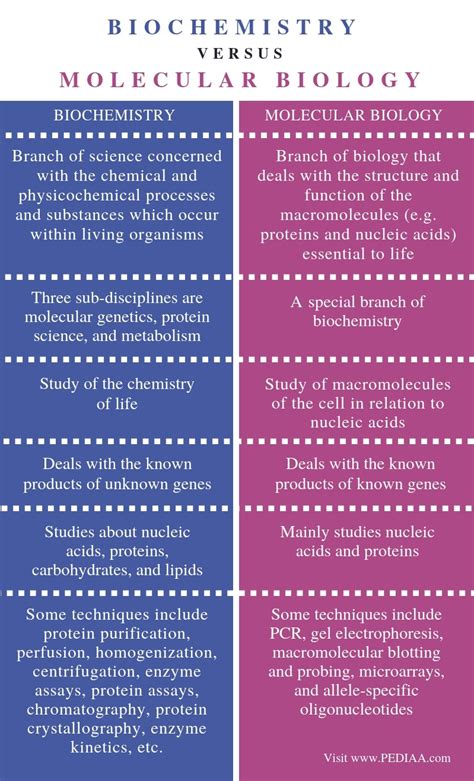Introduction
The realm of life science encompasses two captivating fields: biochemistry and molecular biology. Both disciplines delve into the intricacies of biological systems, but each approaches them from distinct perspectives. This article aims to elucidate the differences and interconnections between these two pivotal branches of science.

Biochemistry: The Chemistry of Life
Definition: Biochemistry explores the chemical processes and structures that underpin life. It focuses on understanding the chemical composition, structure, and interactions of molecules essential for biological functions.
Areas of Study:
– Chemical structures and properties of biomolecules (proteins, carbohydrates, lipids, nucleic acids)
– Enzyme catalysis and metabolic pathways
– Gene regulation and protein synthesis
– Molecular basis of diseases
Applications:
– Drug development and therapy
– Food chemistry and nutrition
– Biotechnology and genetic engineering
Molecular Biology: The Study of Genetic Information
Definition: Molecular biology revolves around the structure, function, and transmission of genetic information. It unravels the mechanisms of DNA replication, transcription, translation, and gene regulation.
Areas of Study:
– Structure and function of DNA, RNA, and proteins
– Gene expression and regulation
– Genome sequencing and analysis
– Biotechnology and DNA technology
Applications:
– Genetic engineering and gene therapy
– Personalized medicine and diagnostics
– Forensics and evolutionary biology
Similarities
- Both fields share a focus on understanding biological systems at the molecular level.
- They employ a variety of experimental techniques, including microscopy, spectroscopy, and bioinformatics.
- Both disciplines have applications in medicine, biotechnology, and agriculture.
Differences
- Focus: Biochemistry concentrates on the chemical aspects of life, while molecular biology emphasizes genetic information and its expression.
- Approach: Biochemistry adopts a more reductionist approach, studying individual molecules, while molecular biology takes a more holistic view, considering interactions between molecules and cellular processes.
Despite their differences, biochemistry and molecular biology are inextricably intertwined. The chemical processes studied in biochemistry provide the foundation for understanding the genetic information deciphered in molecular biology.
For example, the enzymes that participate in biochemical reactions are encoded by genes, and the metabolic pathways they regulate are controlled by gene expression. Conversely, molecular biology techniques have revolutionized the study of biochemistry by enabling the identification and characterization of specific molecules and proteins.
The convergence of biochemistry and molecular biology has led to countless groundbreaking applications:
- Biotechnology: The development of genetically modified organisms (GMOs) for food production and medicine
- Medicine: The design of targeted therapies for genetic diseases and the early detection of genetic disorders
- Forensics: The use of DNA fingerprinting for criminal investigations and paternity testing
- Evolutionary Biology: The understanding of genetic diversity and the mechanisms of evolution
Combining biochemistry and molecular biology offers a fertile ground for conceiving innovative applications:
- Biocatalysis: Utilizing enzymes for sustainable chemical production and bioremediation
- Bioelectronics: Developing biosensors and biocomputers based on molecular interactions
- Personalized Nutrition: Tailoring diets based on an individual’s genetic profile
- Cultivate a strong foundation in both chemistry and biology.
- Develop analytical and problem-solving skills.
- Familiarize yourself with experimental techniques.
- Stay updated on the latest advancements.
- Consider pursuing a graduate degree in biochemistry or molecular biology.
Pros:
– High demand for skilled professionals in both fields
– Opportunities for groundbreaking research and innovation
– Applications in a wide range of industries
Cons:
– Competitive job market due to high demand
– Requires rigorous training and extensive knowledge
– Can be a demanding and time-consuming field
-
What is the difference between biochemistry and molecular biology?
– Biochemistry focuses on the chemical processes of life, while molecular biology studies genetic information and its expression. -
Which field is more suitable for me?
– Consider your interests in chemistry, biology, and the specific applications that appeal to you. -
What are the career prospects in biochemistry and molecular biology?
– Both fields offer excellent job opportunities in academia, industry, and government. -
How can I prepare for a career in biochemistry or molecular biology?
– Pursue a strong academic background, develop laboratory skills, and stay abreast of current research. -
What are some examples of the applications of biochemistry and molecular biology?
– Drug development, genetic engineering, and personalized medicine are some notable examples. -
How can I stay updated on the latest advancements in the field?
– Attend conferences, read scientific journals, and connect with researchers through social media. -
What is the current state of the job market for biochemistry and molecular biology professionals?
– The job market is competitive, but there is a high demand for skilled professionals. -
What are the salary expectations for biochemistry and molecular biology professionals?
– Salaries vary depending on factors such as experience, education, and industry. However, professionals in these fields typically earn competitive salaries.
Biochemistry and molecular biology are fundamental disciplines interconnected by their shared goal of understanding the complexity of life. While they differ in their emphases and approaches, their synergy has propelled scientific advancements and paved the way for innovative applications in various fields. As we continue to unravel the mysteries of life, the interplay between these two disciplines will undoubtedly lead to even more groundbreaking discoveries.
